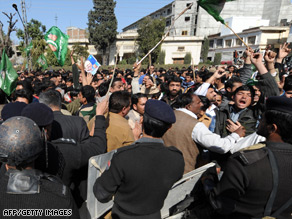
Supporters of Pakistani opposition leader Nawaz Sharif took to the streets Thursday, burning cars and damaging shops, after the Supreme Court ruled Wednesday that he and his brother cannot hold elected office.
The protests also resulted from President Asif Ali Zardari on Wednesday imposing governor’s rule in the state of Punjab, Pakistan’s most populous state. Punjab is the power center for Sharif’s party, and where his brother, Shahbaz, was chief minister. The president’s move to suspend the state’s parliament and impose executive rule there for two months — and the Supreme Court ruling — were immediately condemned by Sharif supporters as politically motivated. In thousands, they have rallied in cities in Punjab, and in smaller numbers in the states of Sindh and Balochistan. Zardari’s spokesman said executive rule was needed because “an unprecedented and unique constitutional void had been created” when the court stripped Shahbaz Sharif of his post. Nawaz Sharif leads the Pakistan Muslim League – Nawaz (PML-N), which captured the second-most number of votes in parliamentary elections last year. Zardari heads the ruling Pakistan People’s Party. Zardari became president after the assassination of his wife, Benazir Bhutto in 2007. The two men are bitter rivals, and the renewed tensions threaten to take the focus away from the government’s attempts to quash an escalating pro-Taliban insurgency in the country.
Don’t Miss
Report: Pakistan agrees to fresh Taliban truce
Blaze erupts at Marriott Hotel in Pakistan
In disqualifying Nawaz Sharif, the Supreme Court cited a criminal record that dates to the late 1990s, when he refused to allow an airliner carrying then-military chief Gen. Pervez Musharraf to land. That eventually led to Sharif’s conviction for hijacking and treason. Separately, Sharif also was convicted of corruption that year. He went into exile instead of prison, but returned to Pakistan to challenge Musharraf’s rule. However, the election commission barred Sharif from the parliamentary race. His brother, Shahbaz, was shut out because of financial irregularities, the commission said. The Supreme Court upheld the commission’s decisions.
